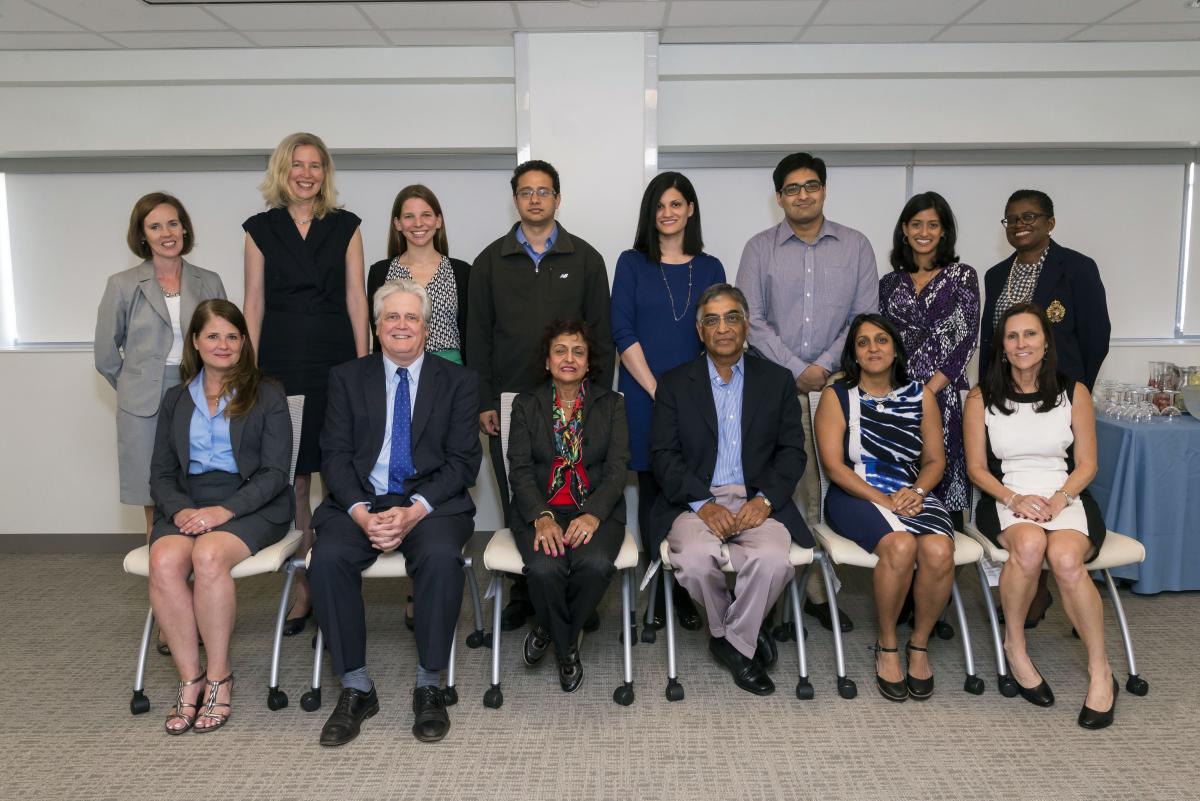Ujala Foundation Recognized for Commitment to Hopkins Work in India

Back Row: Ashlyn Sowell, Kelly Dooley, Jessica Elf, Rupak Shivakoti, Natasha Chida, Akshay Gupte, Jyoti Mathad,
Leslie Bernard. Front Row: Molly Bowen, Bob Bollinger, Kamla Gupta, Raj Gupta, Amita Gupta, Jane McKenzie-White
Photography: Jon Cristofersen
Baltimore, MD—On April 30, 2015, the Ujala Foundation was recognized by the Johns Hopkins University School of Medicine for its generous support to address some of India’s most serious health burdens.
An ardent supporter of work in India for years, the Ujala Foundation reconfirmed its commitment by recently pledging $2.5 million toward the Building Bridges to a Healthier India campaign, a 5-year, $25 million development initiative to sustain and grow health leadership development, education, and clinical research programs in India.
The Ujala Foundation donation affords a two-pronged approach toward its work: ensuring long-term sustainability of efforts through the establishment of an endowment fund for work in India, and supporting ongoing work through the establishment of the Ujala Scholars Program, an effort that provides for the professional development and clinical research of 7 early-career scientists. These scientists are addressing some of India’s most critical infectious and chronic disease challenges—including tuberculosis, HIV, cancer, and diabetes—as well as public health issues such as environmental pollutants, child and maternal health, and nutrition.
In a private event at the Johns Hopkins medical campus, Raj and Kamla Gupta of the Ujala Foundation were honored for their support by Johns Hopkins University and Department of Medicine leadership. Johns Hopkins University Vice Provost of Research Dr. Landon King opened the proceedings by reflecting on the definition of Ujala: great light; he noted that the generosity of the Foundation had provided a great light to illuminate a pathway for groundbreaking research at Johns Hopkins.
Other presenters included Dr. Mark Anderson, Director of the Johns Hopkins University Department of Medicine—who noted that the Johns Hopkins Hospital was established through the largest philanthropic gift of its time, and the Ujala Foundation’s support embodies that legacy of philanthropy—and Director Bob Bollinger—who expressed deep gratitude to the Guptas, who live the message of Gandhi’s famous words “Be the change you want to see in the world.” Dr. David Thomas, Director of the Division of Infectious Diseases echoed gratitude for the Foundation’s generosity, and remarked that the potential for real change resulting from Ujala support was breathtaking.
The highlight of the program was an hour of presentations by Ujala Scholars based in the U.S. and in India, who each outlined the health issues and research efforts they were undertaking as a result of the Ujala Scholars Program.
The proceedings concluded with remarks by Ujala Foundation President Raj Gupta, who noted that when he landed at JFK Airport in 1968, he had $8 in his pocket, and philanthropic support for education and healthcare is an important opportunity for him to do something meaningful and to give back. He expressed gratitude for the real changes in health outcomes, and noted that he was touched by what has been accomplished by Hopkins research thus far.
